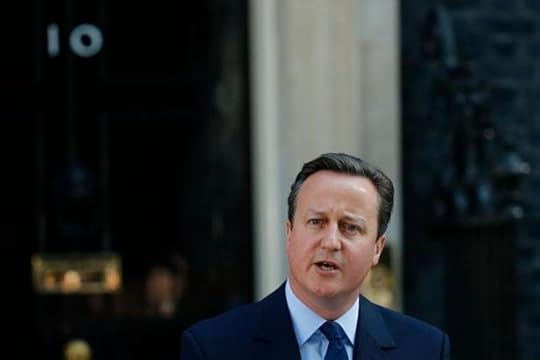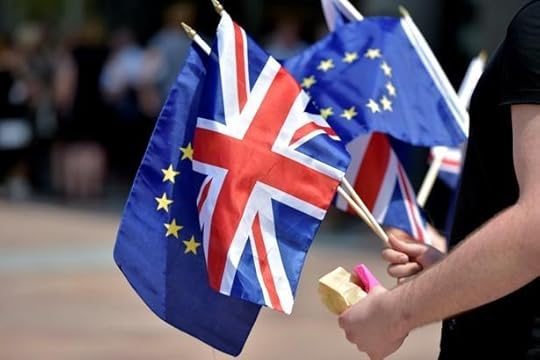Atlantic Monthly Contributors's Blog, page 134
June 25, 2016
Vince Staples and Jay Z’s Midlife Crisis: The Week in Pop-Culture Writing

Vince Staples, Regular Genius
Jeff Weiss | The Fader
“He strips away the glorification of gangsta rap and reminds listeners that their entertainment doesn’t come without a body count and other brutal consequences. Staples has transcended comparisons, but if you needed to make one: He’s the closest heir to the Ice Cube of Death Certificate crossed with the Ice Cube of Friday.”
40 Is the New 40
Sean Fennessey | The Ringer
“His investments — not just a professional sports team, but alcohol, nightclubs, clothing brands, a website — and his family had become interwoven. His pirouette across the tightrope of American success was near-complete. ‘If you escaped what I’ve escaped,’ he raps on the album, ‘you’d be in Paris getting fucked up, too.’ He could have disappeared forever that night with a life well lived.”
The 1975: Talking Fandom and Philosophy With Pop’s Most Daring Radicals
Meaghan Garvey | MTV News
“It wasn’t that they’d found their lane so much as realized how to effectively swerve between all of them. Flashes of perfect ’80s-inspired pop-rock were bookended by wordless ambient experiments. None of this could have entirely predicted the dense, uncategorizable glory of their latest record, but at least they tried to warn us.”
Think Gender Is a Performance? You Have Judith Butler to Thank For That.
Molly Fischer | New York
“Theoryspeak, meanwhile, has infiltrated civilian vocabularies. Trope and problematic and heteronormative; even, in a not-quite-Butlerian sense, performative—the sort of words that rankled queer theory’s culture-wars critics—are right at home on Tumblr and Twitter. In a broad-stroke, vastly simplified version, the understanding of gender that Gender Trouble suggests is not only recognizable; it is pop.”
The State of the Domestic Goddess
Emily Gould | Eater
“Being a domestic goddess is not the same as being a woman cookbook author, and it is definitely not the same as being a woman chef. One can be the head of an empire devoted to perfecting domesticity in all its forms and still not—sorry, Martha—be a domestic goddess. A certain sloppiness or silliness is required; a non-professional, self-taught, this-is-just-what-works-for-me vibe.”
Inside the Mind of Steven Spielberg, Hollywood’s Big, Friendly Giant
Jon Mooallem | Wired
“It’s like there’s a Spielberg film happening behind the scenes of all these Spielberg films—a potentially gut-wrenching fable about the loss of innocence, about a displaced child cornered by the machinery of the grown-up world. And Spielberg wants to direct that story too—steer it toward a safe resolution.”
Letter of Recommendation: Bunk Beds
Zachary Fine | The New York Times Magazine
“I had bought the thing in the name of economy, but it had become an attraction in itself. Perhaps bunk beds, in an age of individuation, tap into our latent desire to share a world—they urge us, after all, to cohabitate, and to explore the pleasures and challenges of unfamiliar intimacies.”
HBO’s Suited and the Search for the Perfect Fit
Linda Holmes | NPR
“All these stories are different in their particulars: Some people change their names, others don’t. Some have surgery, others don’t. Some have supportive families of origin, others don’t. Some care profoundly what pronoun is used to describe them, others don’t. But they all want to look good in a suit. And the specificity of that common desire protects the film against any tendency toward the generic.”

June 24, 2016
Deadly Flooding in West Virginia

At least 14 people have died in West Virginia from flooding over the past two days, Governor Earl Ray Tomblin said on Friday.
Announcing the deaths, the governor said, “Please continue to work together and support each other as West Virginians always do.”
Heavy rains on Thursday led to severe flooding, and left at least 35,000 people without power. At least 100 homes were destroyed, as well:
#Flood water pushes a burning #home down a creek in #WestVirginia. #wvwx
Britain Votes For Brexit

—In a historic vote, the United Kingdom has voted to leave the European Union by a 52-percent-to-48-percent margin, according to forecasts from the BBC, ITV, and others.
—Prime Minister David Cameron says he will step down by October.
—The stunning move raises major questions not only about how the U.K. will extricate itself from the 28-member bloc and the relationship it will have with it, but also about the country itself, and of the EU, post-World War II Europe's most ambitious political experiment.
—Polls were tight ahead of Thursday's referendum, but as the votes rolled in, the “leave” side performed better than expected in places it was supposed to win and triumphed in locations it was not. The “remain” side, despite the establishment's optimism, could never catch up.
—The pound slid to a 31-year low against the dollar on the news, and stocks are sharply lower, as are Dow futures.
—We’re live-blogging the events as they happen, and you can read how it all unfolded below. All updates are in Eastern Standard Time (GMT -5).
3:34 p.m.
While the world—and certainly its financial markets—are acting as if the sky has fallen on its head, the German Foreign Office provides some perspective on its Twitter feed:
We are off now to an Irish pub to get decently drunk. And from tomorrow on we will again work for a better #Europe! Promised! #EURef
Brazil's Shuttered Anti-Doping Lab

Rio de Janeiro may not have an anti-doping laboratory for the Olympic Games this summer.
The World Anti-Doping Agency said Friday it was suspending the city’s accredited laboratory from conducting tests on urine and blood samples due to “non-conformity” with the International Standard for Laboratories. The suspension, which took place Wednesday, will remain in place until the Brazilian Doping Control Laboratory “is operating optimally.” WADA did not specify on the lab’s shortcomings.
Announcing the suspension, Olivier Niggli, the incoming director general of WADA, said:
“The Agency will ensure that, for the time being, samples that would have been intended for the Laboratory, will be transported securely, promptly and with a demonstrable chain of custody to another WADA-accredited laboratory worldwide. This will ensure that there are no gaps in the anti-doping sample analysis procedures; and that, the integrity of the samples is fully maintained.”
The lab has had several issues in recent years. It lost its certification before the 2014 soccer World Cup, also held in Rio. Authorities had to outsource its drug testing to a lab in Lausanne, Switzerland.
In that case, authorities had to transport the samples from 32 teams across the Atlantic. But in the Olympics, with far more teams competing, it’s a greater challenge to get testing done in a timely fashion.
This isn’t the first time that an Olympic host city has had problems with its drug testing. As The New York Times reported in May:
During the 2014 Winter Games in Sochi, according to an independent report commissioned by the World Anti-Doping Agency, officials at a Moscow lab destroyed the samples of Russian athletes with the help of federal police. The report led to the suspension of Russian track and field athletes from global competition, and the lab in question lost its certification.
“It’s an extraordinary manual of what not to do,” said Marco Aurelio Klein, national secretary of the Brazilian Doping Control Authority. “We reviewed all of our procedures after reading it.”
Brazil reportedly spent $60 million to prepare its laboratory. That apparently was not enough, as Brazil faces its own certification hardships so close to the Summer Games that start August 5.

The Growing California Wildfire

A massive wildfire north of Los Angeles has burned 8,000 acres, destroyed 80 homes, and by Friday was headed toward several more communities.
The fire, near Lake Isabella in Kern County, has forced thousands of people to evacuate. Over Thursday night, it had spread 11 miles in 13 hours. About 300 firefighters were working to contain it.
Here are a few photos of the fire, which has been named the Erskine Fire:
'Extremely dangerous, volatile' #ErskineFire in Kern County-80 homes burned, 1500 threatened https://t.co/fe2F7Z3M5c pic.twitter.com/gCmlUuAFOq
— Ed Joyce (@EdJoyce) June 24, 2016
#ErskineFire photos by Michael Cuffe, used with permission. UPDATES: https://t.co/Yy9WD034h0 pic.twitter.com/YBzgzrwfRa
— KBAK/KBFX TV (@bakersfieldnow) June 24, 2016
FIRE SEASON 2016#ErskineFire June 3, 2016 Lake Elsabella, California@chief_miller #chief… https://t.co/t77HSj2WeU pic.twitter.com/x9YASzutFS
— Dave Mills (@DaveMillsPhoto) June 24, 2016
Five years of drought combined with a burst of spring rain that quickened grass growth has fueled the fire. Winds have also added to the blaze’s explosive growth. Several buildings, including a school, were set up as evacuation centers. By Friday afternoon, there were no injuries; firefighters were being treated for smoke inhalation.

Who Wants to Buy A Rat's-Head Mug Owned By Whitey Bulger?

On Saturday the F.B.I. will auction off 30 paper towels, a sterling silver “Psycho Killer Skull” ring, and a ceramic cup shaped like a rat’s head, all of which were owned by James “Whitey” Bulger, the Boston gangster convicted of 11 murders.
Bulger is now serving two life sentences in prison. But in 1994 Bulger fled Boston after a corrupt FBI agent tipped him off, and he spent 16 years on the lam––many of them while on the bureau’s “Ten Most Wanted List.” Officers found Bulger and his girlfriend in 2011, at a rent-controlled apartment in Santa Monica, California. Bulger was 81 at the time, and investigators found him with an arsenal of weapons, and $822,000 stashed inside a wall. Bulger also had an apartment full of random belongings, which, along with the cash from his apartment, are being sold by the U.S. Marshals Service and Gaston & Sheehan Auctioneers to compensate Bulger’s many victims.
Some of the items for sale include a coffee mug shaped like a rat’s head that Bulger kept pencils in.

Gaston & Sheehan Auctioneers
A Boxing mannequin wearing a sun hat.

Gaston & Sheehan Auctioneers
As well as this “Psycho Killer Skull” ring made by Crazy Pig Designs, a jewelry maker based in London.

Gaston & Sheehan Auctioneers
Some of the other things for auction were a wooden crucifix, random house supplies and dishes, and Bulger’s collection of watches, one of which was listed at $140,000.
Thomas J. Abernathy III, the assistant chief inspector for the U.S. Marshals Service, told the Associated Press: “We’re hoping to be able to use his fame — if that’s what you want to call it — to generate some higher prices for some of this stuff. The theme here is to just try to get as much as we can for the victims, but nothing will ever bring their loved ones back.”
Steve Davis, a man who believes Bulger killed his sister in the 1980s, told the AP: “I think the people who are going to bid on it — to own a piece of the rat bastard he was — it’s really sick.”
At one time, Bulger was an FBI informant. But after he fled Boston, the department offered a $2 million reward for his capture. To track him down, the bureau bought TV time slots––350 in 14 cities––in the hopes someone would call in a tip. Authorities finally caught him after they focused in on Bulger’s girlfriend, Catherine Greig, and tracked the two to their California apartment. Her belongings will also be sold. They include a cat coffee mug, and salt and pepper shakers shaped like poodles.

Brexit FAQs: What Happens Next?

First, are the results really binding?
For the pro-“remain” side, this may be more wishful thinking than anything—given the scale of the “leave” victory—but, in theory at least, the referendum’s results are not binding. That’s because, in the U.K., it is Parliament that is sovereign. Referenda themselves are rare in the country—and Thursday’s was only the third in U.K. history.
Here’s more from the Financial Times earlier this month:
The relevant legislation did not provide for the referendum result to have any formal trigger effect. The referendum is advisory rather than mandatory. The 2011 referendum on electoral reform did have an obligation on the government to legislate in the event of a “yes” vote (the vote was “no” so this did not matter). But no such provision was included in the EU referendum legislation.
What happens next in the event of a vote to leave is therefore a matter of politics not law. It will come down to what is politically expedient and practicable. The UK government could seek to ignore such a vote; to explain it away and characterise it in terms that it has no credibility or binding effect (low turnout may be such an excuse). Or they could say it is now a matter for parliament, and then endeavour to win the parliamentary vote. Or ministers could try to re-negotiate another deal and put that to another referendum. There is, after all, a tradition of EU member states repeating referendums on EU-related matters until voters eventually vote the “right” way.
The Guardian has a similar explainer.
The official mechanism for the U.K. to leave the EU is the invocation of Article 50 of the Lisbon Treaty. Here’s what that says:
1. Any Member State may decide to withdraw from the Union in accordance with its own constitutional requirements.
2. A Member State which decides to withdraw shall notify the European Council of its intention. In the light of the guidelines provided by the European Council, the Union shall negotiate and conclude an agreement with that State, setting out the arrangements for its withdrawal, taking account of the framework for its future relationship with the Union. That agreement shall be negotiated in accordance with Article 218(3) of the Treaty on the Functioning of the European Union. It shall be concluded on behalf of the Union by the Council, acting by a qualified majority, after obtaining the consent of the European Parliament.
3. The Treaties shall cease to apply to the State in question from the date of entry into force of the withdrawal agreement or, failing that, two years after the notification referred to in paragraph 2, unless the European Council, in agreement with the Member State concerned, unanimously decides to extend this period.
4. For the purposes of paragraphs 2 and 3, the member of the European Council or of the Council representing the withdrawing Member State shall not participate in the discussions of the European Council or Council or in decisions concerning it.
A qualified majority shall be defined in accordance with Article 238(3)(b) of the Treaty on the Functioning of the European Union.
5. If a State which has withdrawn from the Union asks to rejoin, its request shall be subject to the procedure referred to in Article 49.
Article 50 has not yet been invoked, but it’s highly unlikely that, now that the referendum results have been announced, the will of the British public will be ignored just because the political establishment doesn’t like the outcome. The EU itself appears to be ready for the U.K. to leave. Here’s the joint EU statement:
We now expect the United Kingdom government to give effect to this decision of the British people as soon as possible, however painful that process may be. Any delay would unnecessarily prolong uncertainty. We have rules to deal with this in an orderly way. Article 50 of the Treaty on European Union sets out the procedure to be followed if a Member State decides to leave the European Union. We stand ready to launch negotiations swiftly with the United Kingdom regarding the terms and conditions of its withdrawal from the European Union.
How long will it take for the U.K. to actually leave?
No country has voted to leave the EU before, so there’s no precedent to judge by. But in theory, it’s supposed to take two years. In this time the U.K. will negotiate with the EU’s other 27 members on how to extricate itself from the bloc. The U.K. remains an EU member, with all the rights and privileges associated with that, until then. The two-year term is the period spelled out in an EU briefing paper on Article 50. Here’s what the paper says:
The right of a Member State to withdraw from the European Union was introduced for the first time with the Lisbon Treaty; the possibility of withdrawal was highly controversial before that. Article 50 TEU does not set down any substantive conditions for a Member State to be able to exercise its right to withdraw, rather it includes only procedural requirements. It provides for the negotiation of a withdrawal agreement between the EU and the withdrawing state, defining in particular the latter's future relationship with the Union. If no agreement is concluded within two years, that state's membership ends automatically, unless the European Council and the Member State concerned decide jointly to extend this period. The legal consequence of a withdrawal from the EU is the end of the application of the EU Treaties (and the Protocols thereto) in the state concerned from that point on. EU law ceases to apply in the withdrawing state, although any national acts adopted in implementation or transposition of EU law would remain valid until the national authorities decide to amend or repeal them. A withdrawal agreement would need to address the phasing-out of EU financial programmes and other EU norms. Experts agree that in order to replace EU law, specifically in any field of exclusive EU competence, the withdrawing state would need to enact substantial new legislation and that, in any case, complete isolation of the withdrawing state from the effects of the EU acquis would be impossible if there is to be a future relationship between former Member State and the EU. Furthermore, a withdrawal agreement could contain provisions on the transitional application of EU rules, in particular with regard to rights deriving from EU citizenship and to other rights deriving from EU law, which would otherwise extinguish with the withdrawal.
What happens to the U.K.?
The United Kingdom comprises England, Scotland, Wales, and Northern Ireland. Among them, the “leave” side won in England and Wales, while most voters in Scotland and Northern Ireland voted to remain. Leaders in both places have said they will explore options to continue their relationship with the EU.
In Scotland, the “remain” camp won by a 62 percent-to-38-percent margin. Nicola Sturgeon, Scotland’s first minister, says those numbers mean Scotland wants to continue its relationship with the EU, and, she says, a referendum on Scottish independence from the U.K. “must be on the table, and it is on the table.”
This would be a second Scottish referendum on independence. The previous one, held in 2014, was close. It had an 84 percent turnout, and the side that campaigned for continued union with the U.K. won with 55.3 percent of the vote; those who wanted independence won 44.7 percent.
Turnout in Scotland for Thursday’s referendum was 68.4 percent—far lower than the figure for the rest of the U.K.
Northern Ireland also voted for the U.K. to remain, by a 56 percent-to-44 percent margin. First Minister Arlene Foster of the Democratic Unionist Party, the predominantly Protestant grouping, said the results showed “we are now entering a new era of an even stronger United Kingdom.” But Martin McGuinness, the deputy first minister, who belongs to Sinn Fein, the political wing of the Irish Republican Army, says the results show Northern Ireland should be able to vote on a union with the Republic of Ireland, which is an EU member.
Dragging us out of Europe will be to the detriment of all our citizens and will be bad for business, trade, investment, and wider society. I, and all Sinn Fein ministers will work to ensure the political institutions remain on a stable footing, but it is very difficult to put detailed contingencies in place until we know the extent of the impact of Brexit on our finances, our infrastructure and health services. All of that is still subject to a negotiation but the fact is that we are in unchartered waters. Sinn Fein will be seeking an urgent meeting with the Irish government, the European institutions and also with our counterparts in Scotland to discuss how we move forward in the best interests of all of our people.
It’s unclear what this means. The U.K. government has ruled out any such vote in Northern Ireland, but the contradictory comments put at risk the 1998 Good Friday Agreement that ended the Troubles, a three-decade period of fighting between nationalists and unionists in which some 3,500 people died, and brought political stability to the region.
What about Gibraltar?
Nearly 96 percent of the 30,000 people in the British overseas territory voted to remain in the EU.
Gibraltar, which is near Spain, has been Britain’s since 1713, but Spain claims it as its own. On Friday, Spanish officials raised the possibility of joint sovereignty with the U.K. over Gibraltar. Here’s Jose Manuel Garcia-Margallo, Spain’s acting foreign minister:
It’s a complete change of outlook that opens up new possibilities on Gibraltar not seen for a very long time. I hope the formula of co-sovereignty—to be clear, the Spanish flag on the Rock—is much closer than before.
Britain’s unlikely to cede any control over Gibraltar, however.
What happens to the expats?
This is a complicated question that has consequences for millions of people across the EU. About 1.3 million Britons live in EU countries (Spain, Ireland, and France are their top destinations). About 3 million EU citizens live in the U.K. (Poles, Irish, and Germans are the top three groups). Nothing changes for any of them until the U.K. officially leaves the EU. But as the U.K. negotiates the terms of its exit, the fate of these approximately 4.3 million people is likely to be a top concern. The two sides could continue to allow the free right to work—but that’s unlikely given how European immigration to the U.K. was seen as a driver for the vote to leave. What we are likely to see are restrictions on the movement of workers that range from limited to extreme.
Some EU citizens might have to apply for work permits to live and work in the U.K., which at present has a points-based system for workers from outside the EU. U.K. expatriates in Europe may have to apply for a Blue Card work permit in EU countries, which have restrictive rules for non-EU citizens looking to live and work within their borders. There are also tax and inheritance consequences for expatriates who own property in the U.K. and the EU.
Are there economic consequences?
If the global markets Friday are to be believed, then the answer is yes. But one day’s data does not an economic trend make, so we’ll point you to the boatloads of mainstream economists and international financial institutions that predicted dire economic consequences in the event of a “leave” vote.
Fed Chair Janet Yellen warned of “significant economic repercussions.” Roberto Azevedo, the head of the World Trade Organization, said leaving the EU would cost Britons an extra $13.2 billion in import tariffs. The nonpartisan Institute for Fiscal Studies warned that Britain could face two more years of austerity measures if it votes to leave the EU. The OECD said Brexit would constitute a tax of £2200 per household per year (about $3,000) by 2020 and up to £5000 ($6,817) by 2030. International Monetary Fund chief Christine Lagarde said the impact of Brexit on the U.K.’s economy could range from “pretty bad to very, very bad.” And, finally, Mark Carney, the governor of the Bank of England, warned the consequences “could possibly include a technical recession.”
What about the impact on rules and regulations?
The FT says untangling U.K. rules from the EU’s “would take years and could create constitutional mayhem.” The “leave” vote has consequences not only for British citizens, companies, and public authorities, but also London’s relationship with Scotland, Wales, and Northern Ireland. Laws in those places say acts of their legislative bodies that don’t comply with EU rules are not law.
The problem, as the FT points out:
The nature of the British legal system poses particular challenges for those wanting to roll back existing EU legislation: much of it has been incorporated into British law and tested in the courts, and has thus become part of case law. This means that, even if a statute is removed, its principles — for example, on legislation governing workers’ rights — would remain in force.
To put the scale of what’s happening in context, here’s Daniel Shurman, a partner at Allen & Overy, who told the FT Brexit was a case “of the world’s fifth-largest economy leaving the world’s largest trade bloc.”
“If one wanted to rewrite the many thousands of pages [of relevant legislation] from the start it would obviously be an incredibly complex and time-consuming task,” he told the newspaper, “and I don’t think people have fully fathomed the challenge.”
What’s next for the EU?
This too is a complicated question. There were fears that Britain’s exit would energize Euroskeptics across the bloc. Indeed, polls in Denmark have suggested that the country would vote to leave if a referendum were held on membership (none is planned). Far-right parties across Europe rejoiced at the news from Britain Friday. Marine Le Pen, the head of the National Front in France, said on Twitter: “Victory for Freedom! As I have been asking for years, we must now have the same referendum in France and EU countries.” Similar sentiments were expressed by others across the bloc. Whether that translates to referenda in those countries and subsequent votes to leave is an unknown, however.

On the Abysmal, Excruciating Independence Day: Resurgence

The 1996 alien-invasion classic Independence Day may have been undoubtedly goofy, but it also reinvented the modern blockbuster, imbuing it with spectacle, fiendishly expensive shots of destruction, and well-delivered one-liners. For all its silliness, the movie has endured because it contains real menace, an impressive cast of charismatic stars, and a story with a clear beginning, middle, and end. By contrast, its sequel Independence Day: Resurgence, which comes this weekend 20 years after the original’s release, barely registers as a cohesive film in any sense.
Instead, it’s 25 minutes of plot stretched into a two-hour film that somehow feels interminable—and it doesn’t even have the decency to blow up an American landmark along the way. It’s easy to bleat about the current dependence on sequels and the lack of compelling movie stars, but Independence Day: Resurgence offers the most serious evidence yet for that kind of hand-wringing. It’s a non-movie, an insult to the blockbuster genre, and should stand only as a perfect example of Hollywood’s more glaring deficiencies as an industry. Its 1996 progenitor might have been the beginning of a shift toward expensive CGI endeavors, but let Resurgence be the end, before summer tentpoles decline any further.
The director Roland Emmerich used to be a master of grand, fiery nonsense. To this day, his destruction of the White House and the Empire State Building in Independence Day is the pinnacle of disaster cinema, a summit he tried to reach again and again with films like Godzilla, The Day After Tomorrow, and 2012. Those films at least made a solid effort to bring something original to the apocalypse, from a new ice age to colossal tidal waves engulfing the world’s highest mountains. Resurgence doesn’t want to repeat the national landmark-exploding tricks of its predecessor (there’s even a sight gag involving the White House getting spared from destruction), so it opts for a baffling mess of doom: an ocean-sized alien spaceship that somehow picks up Asia with its gravitational field and dumps it onto Europe. The scene is as confusing to behold as it is difficult to imagine.
But to back up: Resurgence is set 20 years after Independence Day, in a society vastly different from our own, augmented with alien technology harvested by the many city-sized motherships that crash-landed on Earth during the first invasion. It’s a suitably bonkers idea, and the some of the film’s early imagery can be fun to wrap your head around. There’s a rebuilt, antique-y White House and Capitol Building surrounded by flying cars and sci-fi skyscrapers; a moon base doing deep-space defense research and trying to keep the planet safe; and a gaudy oil painting of Will Smith in his U.S. Air Force jacket to serve as a reminder of just what the film’s missing this time around.
Steven Hiller, Smith’s character from the first film, is gone, having perished in a test flight (a frankly rude way to dispatch him), but his son Dylan (Jessie Usher) is there in his stead, as is the former First Daughter Patricia Whitmore (now played by Maika Monroe), along with her love interest Jake Morrison (the reliably bland Liam Hemsworth). Returning from their 1996 adventure are the former President Thomas Whitmore (Bill Pullman), now bearded and plagued with visions of alien invasion; David Levinson (Jeff Goldblum), now in charge of Earth’s extra-terrestrial defense; and his tetchy father Julius (Judd Hirsch), who in the intervening two decades has written a book and moved to a houseboat.
“What goes up, must come down,” Goldblum sighs as the remnants of Beijing are dumped upon London.
The performances range from bemused (Goldblum maintains a sarcastic air throughout) to barely there, particularly in the case of the film’s younger stars. There’s only a feeble effort to invest the latter with some backstory—Dylan is haunted by his father’s death, Jake is a hothead driven by the loss of his parents in the 1996 attacks, and Patricia is torn between a life of politics and piloting alien fighter jets. Smith’s performance in Independence Day was electric and marked the birth of the kind of movie star Hollywood is lucky to get once in a generation. (Just imagine someone else punching an alien, lighting a cigar, and triumphantly saying “Welcome to Earth.”) His replacements unfortunately don’t get anything like the same type of memorable material to work with.
Earth has turned into a hybrid-alien superpower in the last 20 years, but of course, that doesn’t matter once the aliens come back to finish what they started. “That’s definitely bigger than the last one,” Goldblum deadpans upon seeing the 3,000-mile-wide mothership that attaches itself to the planet like some giant limpet. “What goes up, must come down,” he sighs as the remnants of Beijing are dumped upon London. “They like to go for the landmarks,” he snorts as London’s Tower Bridge is engulfed in an inferno.
Independence Day had a genuine sense of threat—it orchestrated the nightmarish destruction of Washington, New York, and Los Angeles properly, giving the event some heft and making it seem almost impossible to recover from. In Resurgence, half the Earth is wiped out, and it barely seems like a blip in the road. From the start, the audience is led to believe there’s some deus ex machina around the corner, and so the story feels low-stakes—it never truly entertains the possibility that the villains could triumph in the end.
The climactic battle involves a colossal alien queen slithering along some Utah salt flats while Judd Hirsch tools around in a school bus with some plucky teens, which would sound fun if the whole exercise weren’t so insultingly perfunctory. By the time the film wraps things up and makes feeble promises of more alien-battling nonsense in a forthcoming sequel, it’s obvious Emmerich has just been stalling for two hours. That’s Resurgence in a nutshell: a film with 20 years of build-up that seems to exist only to cash a few paychecks, and hopes viewers won’t realize there isn’t a single new idea in the entire picture.

Indie Rock’s Recent, Clear-Eyed Take on Depression

If you read articles about how to help someone with depression, you encounter a few common themes. Don’t tell people to “snap out of it.” Don’t say you know what they feel like. Don’t act as though they have a choice in the matter.
The view of depression as a clinical, chemical phenomenon—an illness—is, theoretically, commonly accepted. Still, many people with depression say that it’s often talked about in unhelpful ways. Music, perhaps, can help. Deep, enduring sadness has been a muse for rock artists for most of the genre’s lifespan, but this year has provided a fascinating crop of young talents finding fresh ways to make art about the topic. The most vibrant examples are Mitski, a 25-year-old singer/songwriter, and Car Seat Headrest, a Seattle band. “Catharsis” doesn’t seem like the right word for what they’re doing; they’re dissecting feelings, trying to convey how they work and what effect they have on a person’s life. The joy of the music is partly in recognition—both of truth and of a sharp writer’s talents.
Mitski’s Puberty 2 opens with a dull jackhammering pulse, maybe meant to represent a kind of looming dread. The song is called “Happy,” and she sings about the title emotion as a one-night stand who disappears from her apartment while she’s in the bathroom, leaving her to clean up candy wrappers and other detritus from his visit. Incongruously loud saxophones blare to horrifying effect, but Mitski’s chorus, like many on the album, is surprisingly sweet-sounding. It’s a very smart take on the idea of emotional absence, and in her press materials Mitski explained what exactly she’s going for: “Happiness is up, sadness is down, but one’s almost more destructive than the other. When you realize you can’t have one without the other, it’s possible to spend periods of happiness just waiting for that other wave.”
The theme holds across highlights like “Fireworks,” where an acoustic guitar briskly strums out a chord progression that creates a feeling of melting while Mitski calmly fantasizes sadness fossilizing into “a slight grey in my eye.” For the trip-hoppy reverie of “Thursday Girl,” she sings, “I’m not happy or sad, just up or down and always bad,” and on the short closer “A Burning Hill,” she describes how lack of control can coexist with perfect self-awareness: “I am the fire and I am the forest /And I am a witness watching it.” To cope, she’ll do nothing dramatic, just wear a white button-down so that she can, at least, “be neat.”
If Puberty 2 masterfully demonstrates how a certain kind of melancholy feels, Teens of Denial, the recent album from Car Seat Headrest, is a powerful companion piece for talking about its causes—or its lack thereof. While Mitski’s songs manage to gut the listener while remaining small and sculptural, frontman Will Toledo works in the style of anthemic but lo-fi rock reminiscent of Modest Mouse or the Get Up Kids. It is surging, fist-raising music, but its lyrical concerns are precise, introspective, and often near-political in criticizing how society treats the congenitally sad.
The opener “Fill in the Blank” uses the conceit of its title to suggest the interchangeability of emotional drains, while the chorus is from the point of view of shiny-happy critics: “You have no right to be depressed / you haven’t tried hard enough to like it.” The trope of the gloriously tortured artist gets sneered at on the jittery “Vincent”: Vincent van Gogh, Toledo informs us, has his picture on the Wikipedia page about clinical depression. On another standout, “Drunk Drivers/Killer Whales,” Toledo sings about feelings as topography, and the metaphor is mirrored in the music’s veering from valleys of strumming to distorted, noisy peaks. The song’s title refers to two very different feelings—leaving a party, and watching the animal-rights documentary Blackfish—that lead to the same feeling of malaise.
It’s a great insight, the notion that a small trigger can upend someone’s entire state. When I saw Mitski perform Wednesday night in Boston, she issued a warning from the stage: “I was reading Hamlet right until I came up here, which was a bad idea. It’s made me very morose.” The news came with a laugh and an acknowledgment that it sounded like a cliché. As the audience then sang back the words she’d recorded on her most recent three albums, it made those words seem all the more extraordinarily specific. That was especially the case for “Last Words of a Shooting Star,” on which she tells of how sudden airplane turbulence makes her imagine what people will think of her bedroom after she’s dead—all of which, conceivably, could be another metaphor for sadness that comes and goes without warning.
But after just 45 minutes of intense performance, with a number of great Puberty 2 songs yet unplayed, the lights went up and Mitski left the stage. “She didn’t want to be up there tonight,” someone near me said. That, of course, was pure presumption—“You actually don’t know me,” Mitski had earlier told an overeager crowd member. You can understand, though, why her songs might make people feel otherwise.

Why Brexit Is So Bad for the Global Economy

Great Britain’s decision to extricate itself from the EU has consequences that are at once far-reaching and unknown. By Friday morning, no market was immune. Great Britain’s currency, the pound, had fallen to its lowest levels since 1985, and the FTSE (an index of the London stock exchange) and DAX (a German stock index) plummeted. In the U.S., markets opened in the red, gold (a commodity that many investors flee to at times of uncertainty) was up, and traders around the globe prepared for a volatile day amid the question of what the future will look like with the U.K. untethered from the European Union.
The health of an economy is significantly influenced by the policies and regulations that govern its financial systems. But the problem here goes far beyond a change in regulations: The bottom line is that no one really knows what will happen in either Great Britain or the EU—and that is in and of itself an economic problem. Markets don’t respond well to uncertainty. It’s understandable, then, that Great Britain’s historic move to shed its formal integration with Europe after almost six decades and the resignation of its prime minister all at one time would send markets into a bit of a frenzy.
While the country won’t have to face the daunting task of creating a new currency (a point of serious concern during Grexit and the Scottish referendum), many of its political and economic policies remain intertwined with the larger European body. Great Britain will be the first country to actually leave the European Union, and the first to have to make sense of the relatively brief guidance on how to do so provided by Article 50 of the Treaty of Lisbon, which helped form the union. The severing of this tie means that important tenets of governing, like major laws, regulations and trade arrangements will need to be updated or renegotiated independently, both within the EU and with trade partners outside. Then there’s the fact that Great Britain will need a new leader to oversee these new changes, since Prime Minister David Cameron—who called for the vote in the first place—stepped down after its conclusion. That, too could make the road to stability a long, arduous one.
Part of the explanation for the markets’ reaction Friday morning is the fact that many didn’t anticipate that the vote would actually swing in the direction of those advocating leaving the EU. And market’s also don’t like surprises.
All of that said, the markets have so far not been nearly as volatile as they were during periods of actual economic crisis, such as the financial meltdown of 2008. That’s somewhat comforting to those who feared that a rift between Britain and the EU would cause a major downturn for the global economy. But still, the reaction has been significant. As of Friday morning, $171 billion was lost in the decline of the FTSE. And as Justin Wolfers noted, American markets moved more on the news of Brexit than they have on news of U.S. presidential elections over the past 60 years. (Of course there are those who may outright benefit from the melee, betting against safety and stability by doing things like shorting British currency or U.K.-based banks.)
There’s reason to fear that the spiral and volatility, at least for the U.K., will not end anytime soon. With stock markets and currency already taking a beating, some are worried that property markets will be next. Additionally some major economic players and investors, such as global investment banks, may shift their global strategies by moving jobs out of the U.K. after publicly supporting the campaign to stay attached to the EU. No one can forecast how the separation will play out, politically or economically—and that alone is something to worry about.
Bourree Lam contributed reporting to this article.

Atlantic Monthly Contributors's Blog
- Atlantic Monthly Contributors's profile
- 1 follower



